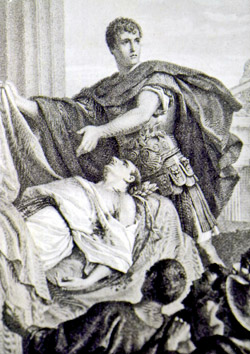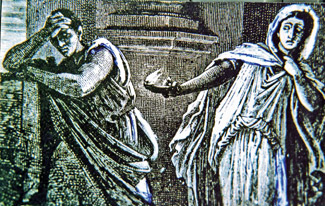Since Brutus failed to heed Portia...
 The
play revolves around two women though they play but minor parts and who
tried to save their husbands; one from being an assassin and the other
being assassinated. Both men refused to heed their wives and thus began
the story of Julius Caesar, the greatest historical tragedy written by
William Shakespeare. The
play revolves around two women though they play but minor parts and who
tried to save their husbands; one from being an assassin and the other
being assassinated. Both men refused to heed their wives and thus began
the story of Julius Caesar, the greatest historical tragedy written by
William Shakespeare.
The Bardís Julius Caesar is different from the real one from Roman
history. Many thought him to be the greatest ruler of the ancient era
and acted as the king of Rome though he was not. Some of his senators in
the Capitol thought him to be foolish and vain and not noble enough.
They found him to be a threat which finally led him to his fall.
|

Mark Antony laments. Friends, romans, countrymen, lends me you
ears. I come to bury Caesar, not to praise him... Act. 111
Scene. 11 |
At the beginning of the play, Shakespeare places Calpurnia and Portia
in a bid to save the situation but he also elevates the foolish ego and
arrogance of the two men, the two most forceful characters of the play.
Yet Shakespeare was convinced in making Caesar less of a hero than he
really was because he had to place Brutus on a pedestal to light up his
virtuosity so that the audience would identify his downfall with
sympathy as a hero placed in wrong circumstances. Shakespeare revealed
how a good and noble man like Brutus could be misled in to inevitable
chaos and civil war of his time. As it always happened, the Bard was at
crossroads when he was faced at a point of treason and found it painful
to untangle the web he had strung because he lived at a time the
monarchs lived in fear of treachery. So, he used Calpurnia and Portia as
the key figures to demonstrate the evil that would befall on Julius
Caesar.
I can recall an incident from history that was almost parallel to
this tragedy when it was being performed during Queen Elizabethís reign
where her trusted favourite, the Earl of Essex was accused of treason
against her and like Brutus championed the cause of honour and
patriotism. Her subjects were aware that like Brutus, the country could
have been plunged into unrest and civil war. But unlike Julius Caesar,
Elizabeth I survived at the height of her career because she was less
ambitious than Caesar and the rightful heir to the English throne.
Why, man, he doth bestride the narrow world,
Like a Colossus, and we petty men,
Walk under his huge legs and peep about
To find ourselves dishonourable graves.
Act. 1, Scene. 11
Obviously, this explains how the senators felt about Caesar who has
already confined in his young friend, Mark Antony why he dislikes
Cassius. Later in the play we find Cassius taking up the role as the
initiator of the assassination and convincing Brutus to lead the
downfall of Caesar.
Brutus is a troubled man. He walks about in the small hours of the
night in his garden brooding over Cassius suggestion to rid Rome of
Caesar. Towards morning and at the dawn of the Ides of March, the
conspirators meet Brutus. They all agree that Mark Antony should be
spared. When the conspirators depart, Portia who had seen the men finds
her husband irritable and confused. She is anxious for Brutus and pleads
with him to confide in her about his problems. Portia who is angry
chides him:
Am I yourself...
But, as it were, in sort of limitation
To keep with you at meals, comfort you bed
And talk to you sometimes...
Act. 11, Scene 1
|

Portia chides Brutus. Act. 11 Scene. 1 |
Portia, daughter to Cato who was a famous statesman is an educated
woman who shared and hear about the affairs of the state from her
husband and often opinioned her feelings and advice.
When finally Brutus tells her of the plot to kill Caesar, she is
deeply disturbed but prays for success. When the enemies appear to be
winning, her feelings get the better of her. In desperation, she commits
suicide rather than face dishonour.
Calipurnia
The weaker of the two women, Calpurnia has a dream, a nightmare when
she sees Caesarís statue pouring in blood. She begs Caesar not to go to
the Capitol. He agrees first but change his mind later. Her influence on
Caesar is not as that of Portia as Caesar prepares to leave. He tells
her not to be afraid of death. She is a study in fear and anxiety.
Cowards die many times before their deaths;
The valiant never taste of death but once.
Of all the wonders that I yet have heard
It seems to me most strange that men should fear;
Seeing that death, a necessary end,
Will come when it will come...
Act.
11 Scene. 11
Both women, as Shakespeare planned, failed to persuade their husbands
not to kill Caesar. |



